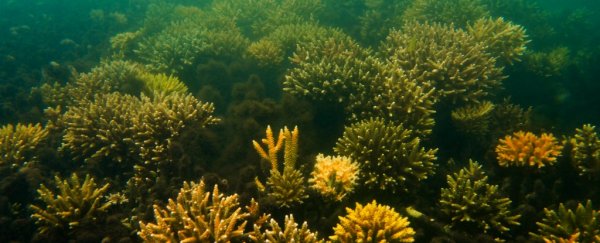The Great Barrier Reef, and other beautiful reefs around the world, are struggling badly with the effects of climate change. While some researchers have heartbrokenly called the Reef "terminal", many are still scrambling to do what they can to save it in whatever capacity available.
One Australian is working on doing just that, having recently identified 'hot spots' of coral resilience, which they've dubbed "super-corals".
"By exploring the very margins - such as reef-neighbouring mangroves that are often ignored by coral surveys - we're continually finding populations of super-coral that are resistant to hot, acidic, and hypoxic conditions predicted under climate change," says one of the team, David Suggett from the University of Technology Sydney (UTS).
"This is a game-changer for how we consider coral reef resilience into the future for the Great Barrier Reef."
The researchers' trip in 2016 to a remote lagoon system in New Caledonia showed some surprising results, uncovering corals that had learnt to thrive in acidic, hot and low oxygen waters.
These kinds of conditions are normally associated with mangroves, but the team thinks that these types of corals might be the best chance for survivors in the oceans warming waters.
"The existence of corals living under this usually deadly trio of conditions, comparable and even exceeding what is predicted under climate change, gives us new hope that some corals will be able to persist into the future," says one of the researchers, Emma Camp.
"These could indeed be the super corals of the future that will help support proactive management options attempting to upgrade reef resilience."
Although the research is promising, the team is quick to point out that this is not going to undo the damage already done, or offer a quick fix for coral reefs and their ecosystems.
"Although our findings are extremely positive, we must not underestimate the threat to the world's coral reefs from climate change," says Suggett.
"We know reefs are terminally ill globally and immediate action is needed to ensure their success."
The researchers now want to investigate the Great Barrier Reef further to determine how the coral populations have adapted to the warming temperatures by analysing water chemistry and DNA sequencing.
"As a result of the expedition we will be able to collect invaluable baseline physical and molecular data to discover how corals within the Great Barrier Reef have already adapted and how they might cope in the future," Camp says.
"I'm excited at the prospect of being able to transfer our discoveries from other sites to our own home reefs."
The research has been published in Scientific Reports.
UTS Science is a sponsor of ScienceAlert. Find out more about their research.
